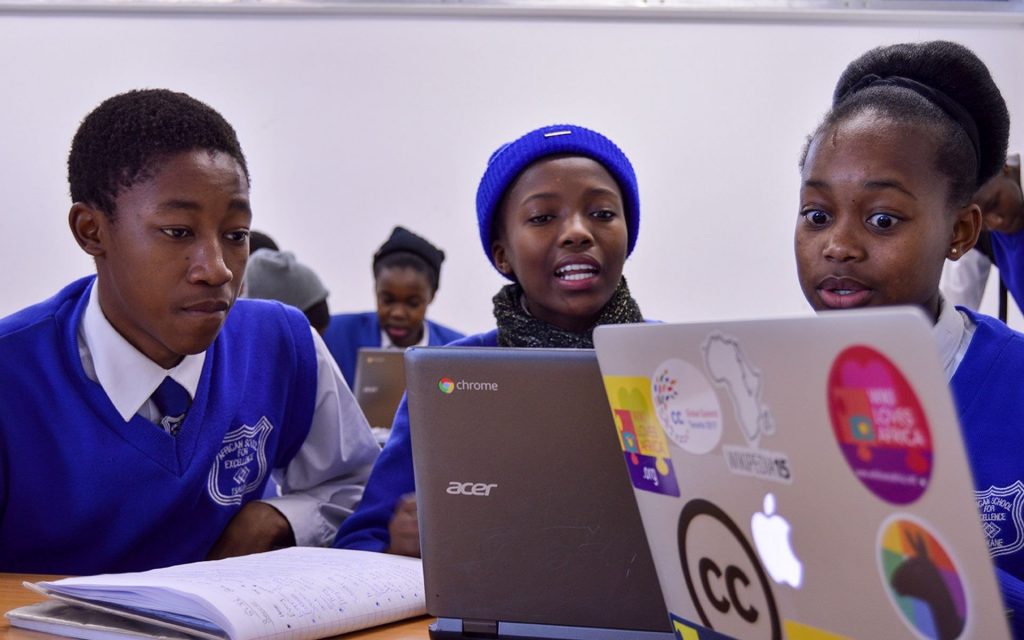Africa and its Antiquated Banking: Bitcoin The Solution?
 Africa has steadily accelerated the switch to modern technologies. But can a continent facing a crisis with antiquated banking technologies, low rate of financial inclusion, poor confidence in the banking system, and high remittance costs become the new battleground for blockchain and cryptocurrency? Also read: Square’s Big Week: Crypto Patent, Shares Leap, and Lightning Plug
Africa has steadily accelerated the switch to modern technologies. But can a continent facing a crisis with antiquated banking technologies, low rate of financial inclusion, poor confidence in the banking system, and high remittance costs become the new battleground for blockchain and cryptocurrency? Also read: Square’s Big Week: Crypto Patent, Shares Leap, and Lightning PlugFrom Algeria to South Africa, Uganda to Nigeria, Africa Is A Potpourri Of Ideas
The continent’s booming technological advancement is reflected in the rapid growth of mobile phone use, both as a means of payment and as a bank account. With more than 100 million active users of mobile money, transacting about $2.1 billion each year, according to McKinsey & Company, Africa is a global leader in mobile-based financial settlements. South Africa The country is Africa’s second biggest economy after Nigeria, with a Gross Domestic Product of $350 billion, according to the International Monetary Fund. In South Africa, cryptocurrencies are growing in popularity. Google Trends indicates that the highest number of bitcoin searches in the world occur in the Southern African country. About 50 percent of South Africans plan to put some money into cryptocurrencies, says a 2018 survey by Mybroadband. The economy, Africa’s most sophisticated, is home to a number of digital currency exchanges – including Luno, which operates in 40 countries worldwide – allowing people to buy and sell digital coins like bitcoin in the local Rand currency. Domestic financial companies are now starting to step into the space. Asset management firm Sygnia has announced plans to open an exchange called Sygnia Coin during the last three months of this year. A litany of start-ups riding on the distributed ledger technology are emerging, including the Johannesburg-based Tari Labs, a blockchain incubator, headed by Monero’s Riccardo Spagni. The South African Reserve Bank (SARB) has pilot tested an inter-bank settlement system code named Project Kohka, which runs on the Ethereum blockchain. Aiming to speed up payments, the system is understood to have performed “exceedingly well” during simulated trials for real-time gross settlements between banking institutions. The SARB does not recognize cryptocurrencies as legal tender, urging caution in their trade. The country’s revenue authority, however, has announced that profits made from cryptocurrency transactions will be taxed in accordance with the South African income tax law. South Africa demonstrates incredible potential to becoming a leader in blockchain development in Africa, leveraging on its well-developed financial and technological infrastructure, friendly regulatory environment and the rising public interest in virtual money. Nigeria In 2014 Nigeria eclipsed South Africa as the continent’s biggest economy, with a GDP of $400 billion. But huge inequalities, corruption and illicit financial flows still persists in Africa’s most populous nation. The blockchain/cryptocurrency sphere in Nigeria is trading under caution from central bank governor Godwin Emifiele who has likened cryptocurrencies “to a gamble.” The Nigerian Parliament has, however, instituted an investigation into the merits and demerits of adopting bitcoin as a means of payment. In spite of all that, Nigerians continue to flood the cryptocurrency space in search of cheaper and faster ways to send money abroad – or receive it – and to hedge against inflation/exchange-related losses of the Naira, the local unit. According to Citigroup, Nigerians account for the world’s third largest holdings of bitcoin, as a percentage of Gross Domestic Product, after Russia and New Zealand. Ignoring warnings from financial regulators, a flurry of start-ups in the country have taken to initial coin offerings, a way used by emerging companies to raise money by issuing new digital coins to the public. One of those companies is Sure Remit, a money transfer business, which raised all the $7 million on offer within two days of the ICO going public. There appears to be a silent admission by regulatory authorities that cryptocurrencies – and the blockchain technology that underpins them – are in the Nigerian economy for the long haul. Hence, efforts seeking to understand virtual currencies to help with their adoption and regulation.
South Africa demonstrates incredible potential to becoming a leader in blockchain development in Africa, leveraging on its well-developed financial and technological infrastructure, friendly regulatory environment and the rising public interest in virtual money. Nigeria In 2014 Nigeria eclipsed South Africa as the continent’s biggest economy, with a GDP of $400 billion. But huge inequalities, corruption and illicit financial flows still persists in Africa’s most populous nation. The blockchain/cryptocurrency sphere in Nigeria is trading under caution from central bank governor Godwin Emifiele who has likened cryptocurrencies “to a gamble.” The Nigerian Parliament has, however, instituted an investigation into the merits and demerits of adopting bitcoin as a means of payment. In spite of all that, Nigerians continue to flood the cryptocurrency space in search of cheaper and faster ways to send money abroad – or receive it – and to hedge against inflation/exchange-related losses of the Naira, the local unit. According to Citigroup, Nigerians account for the world’s third largest holdings of bitcoin, as a percentage of Gross Domestic Product, after Russia and New Zealand. Ignoring warnings from financial regulators, a flurry of start-ups in the country have taken to initial coin offerings, a way used by emerging companies to raise money by issuing new digital coins to the public. One of those companies is Sure Remit, a money transfer business, which raised all the $7 million on offer within two days of the ICO going public. There appears to be a silent admission by regulatory authorities that cryptocurrencies – and the blockchain technology that underpins them – are in the Nigerian economy for the long haul. Hence, efforts seeking to understand virtual currencies to help with their adoption and regulation.Pyramid Scheme
Egypt, Morocco and Algeria The uniformity between the three North African countries – some of the continent’s leading economies – to outlaw cryptocurrencies in their respective economies is galvanized by their common religious beliefs. Under Islamic law “commercial and trade transactions (should) be governed by contracts and clear rules.” Bitcoin does not, say religious leaders. Instead, it promotes tax evasion and terrorism among other financial ills, they say. In Egypt, the Financial Regulatory Authority denied it had given the green light for a digital currency exchange called Bitcoin Egypt to set up shop in the country. The Central Bank of Egypt has said the country’s banking system deals “with official currencies only, and never deal in any virtual currencies.” Much of the trade in Egypt happens underground – on social media platforms like Facebook. The situation in Egypt, Africa’s third largest economy, broadly reflects what is happening in Morocco and Algeria. The Moroccan foreign exchange authority, The Office des Changes has called cryptocurrencies “a hidden payment system not backed by any financial organisation”. Reiterating that all foreign currency related transactions must pass through the central bank, the Exchange Authority warned that anyone using virtual currencies will face significant penalties In Algeria, it is illegal to invest in or hold any digital coins. A Finance Bill that is waiting to become law will punish crypto investors “in accordance with the regulations in force.” The Bill shows utmost disdain for bitcoin, calling it “the so-called virtual currency” that is backed by nothing physical, like banknotes. The general outlook in these three national jurisdictions is that the blockchain/cryptocurrencies will struggle to gain mainstream acceptance and recognition. Kenya Several weeks have passed since the Kenyan parliament in July tasked the country’s Financial Ministry to come up with a determination whether or not to regulate bitcoin and other cryptocurrencies. There has not been any official communication from the Kenyan government in relation to its latest position on the future of bitcoin. However, in April, the Central Bank of Kenya warned banks against dealing with companies involved in the trade of virtual currencies – or that the banks themselves invest in digital coins at all. The central bank reduced bitcoin to a pyramid scheme. Under the veil of such warnings, Kenyan authorities look like they are drawn to the blockchain technology more than they are to cryptocurrencies. In March, President Uhuru Kenyatta set up an 11-member team to investigate the distributed ledger technology, particularly it’s potential use in eliminating inaccuracies within the land registry. Mr. Kenyatta’s government has in the past prevented bitcoin exchanges to make payments through Mpesa, a mobile money service offered by cellular network provider Safaricom, which is 35 percent owned by the government. In the streets of Nairobi, bitcoin continues to thrive despite the shadow of uncertainty hanging over its future. Bancor Network, a fintech company based in the Kenyan capital, in June announced plans to launch a network of blockchain-based communities to help East Africans manage their digital tokens, using part of the $150 million it raised in a token sale last year.
Kenya Several weeks have passed since the Kenyan parliament in July tasked the country’s Financial Ministry to come up with a determination whether or not to regulate bitcoin and other cryptocurrencies. There has not been any official communication from the Kenyan government in relation to its latest position on the future of bitcoin. However, in April, the Central Bank of Kenya warned banks against dealing with companies involved in the trade of virtual currencies – or that the banks themselves invest in digital coins at all. The central bank reduced bitcoin to a pyramid scheme. Under the veil of such warnings, Kenyan authorities look like they are drawn to the blockchain technology more than they are to cryptocurrencies. In March, President Uhuru Kenyatta set up an 11-member team to investigate the distributed ledger technology, particularly it’s potential use in eliminating inaccuracies within the land registry. Mr. Kenyatta’s government has in the past prevented bitcoin exchanges to make payments through Mpesa, a mobile money service offered by cellular network provider Safaricom, which is 35 percent owned by the government. In the streets of Nairobi, bitcoin continues to thrive despite the shadow of uncertainty hanging over its future. Bancor Network, a fintech company based in the Kenyan capital, in June announced plans to launch a network of blockchain-based communities to help East Africans manage their digital tokens, using part of the $150 million it raised in a token sale last year. Sole Mandate
Uganda, Botswana Despite warnings by the The Bank of Uganda against the use of unregulated currencies in the form of bitcoin and other digital coins, global Chinese exchange Binance has expanded into the Central African country, one of the poorest on the continent. Coinpesa, the emerging Ugandan digital currency exchange, on August 31 launched its maiden token sale of 99 million tokens. Ugandan President Yoweri Museveni has spoken positively for the blockchain technology – but not cryptocurrencies. He told the Africa Blockchain conference organised by the Blockchain Association of Uganda, in Kampala in May of the need “to look for a new technology of enabling things to move faster and new systems that go with it.” His central bank governor Emmanuel Tumusiime-Mutebile had apparently spoken to the country in an earlier address to the same conference. Mutebile accused blockchain technology of lacking the necessary support to sustain a currency. But Ugandans, mostly professionals, have taken a particular liking to virtual money. This is a place where bitcoin looks likely to flourish unhindered, with support at Cabinet level. In Botswana, the government has paid little attention to digital currencies because of a very low level of bitcoin adoption. The Central Bank of Botswana has not commented on cryptocurrencies or the blockchain. At the time of writing, there was no known cryptocurrency exchange operating in Botswana. Some trades take place on Whats App, Facebook and on the globalized exchange Localbitcoins.com. Others make use of South African-based exchanges like Altcoin Trader, which accepts deposits directly from Botswana. Satoshicentre, a blockchain start-up in Gaborone has now started to carry out some awareness campaigns around bitcoin mining and trade in cryptocurrencies. Two other start-ups, Plaas, and Inside Studio Africa, are also experimenting with the blockchain. Namibia, Zimbabwe Namibia officially banned the use of cryptocurrencies for commercial purposes in 2017. The Bank of Namibia did not specify penalties for violating the prohibition, but warned that “a local shop is not allowed to price or accept virtual currencies in exchange for goods and services.” It said only the Namibian dollar and the South Africa Rand remained legal tender in the country, but remained open to possibilities offered by the blockchain technology. Even though crypto related activities remain very limited in Namibia, the Bank’s main concern was centered around exchange control violations and issues around the creation of money, which it said was its sole mandate. Similar concerns appear to have spilled over into neighboring Zimbabwe. In May, the Reserve Bank of Zimbabwe directed banks to sever ties with cryptocurrency exchanges, Golix and Styx24, in a de facto ban on digital coins that was largely unexpected. In the past, the central bank had limited its warnings to cautious statements around the risk involved the trading of virtual currencies. Golix, which earlier this year released a bitcoin ATM that has since run dry, is challenging the ban in the Zimbabwean High Court. There were more than 50,000 people buying and selling cryptocurrencies on the Golix platform alone when the ban took effect around May 11. The RBZ-Golix drama has unfolded around an economy that largely doesn’t care about digital currencies, much less understand them. Is crypto the answer to Africa’s woes? Share your thoughts in the comments section below!
Namibia, Zimbabwe Namibia officially banned the use of cryptocurrencies for commercial purposes in 2017. The Bank of Namibia did not specify penalties for violating the prohibition, but warned that “a local shop is not allowed to price or accept virtual currencies in exchange for goods and services.” It said only the Namibian dollar and the South Africa Rand remained legal tender in the country, but remained open to possibilities offered by the blockchain technology. Even though crypto related activities remain very limited in Namibia, the Bank’s main concern was centered around exchange control violations and issues around the creation of money, which it said was its sole mandate. Similar concerns appear to have spilled over into neighboring Zimbabwe. In May, the Reserve Bank of Zimbabwe directed banks to sever ties with cryptocurrency exchanges, Golix and Styx24, in a de facto ban on digital coins that was largely unexpected. In the past, the central bank had limited its warnings to cautious statements around the risk involved the trading of virtual currencies. Golix, which earlier this year released a bitcoin ATM that has since run dry, is challenging the ban in the Zimbabwean High Court. There were more than 50,000 people buying and selling cryptocurrencies on the Golix platform alone when the ban took effect around May 11. The RBZ-Golix drama has unfolded around an economy that largely doesn’t care about digital currencies, much less understand them. Is crypto the answer to Africa’s woes? Share your thoughts in the comments section below!Images courtesy of Shutterstock.
At Bitcoin.com there’s a bunch of free helpful services. For instance, have you seen our Tools page? You can even lookup the exchange rate for a transaction in the past. Or calculate the value of your current holdings. Or create a paper wallet. And much more. The post Africa and its Antiquated Banking: Bitcoin The Solution? appeared first on Bitcoin News.
algeria Bank of Uganda bitcoin egypt Blockchain Association of Uganda Botswana central bank of egypt central bank of Kenya Egypt Emmanuel Tumusiime-Mutebile Godwin Emifiele Golix Google trends Kenya luno Monero Morocco N-Featured naira Nairobi Namibia Nigeria Office des Changes Op-Ed President Uhuru Kenyatta Project Kohka Rand Reserve Bank of Zimbabwe Riccardo Spagni South Africa South African Reserve Bank (SARB) Sure Remit Sygnia Coin Tari Labs Uganda Yoweri Museveni Zimbabwe



